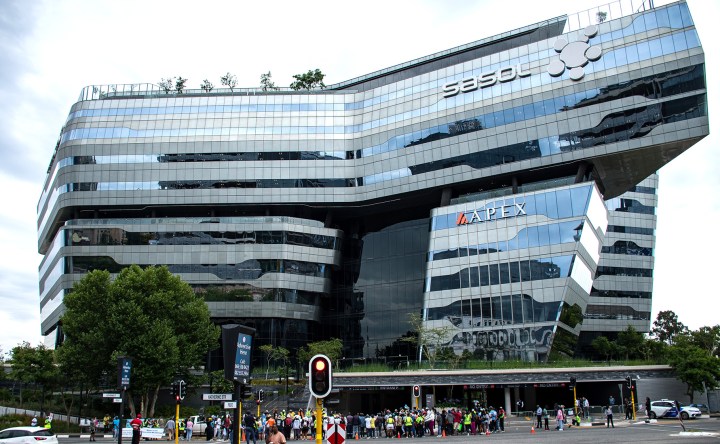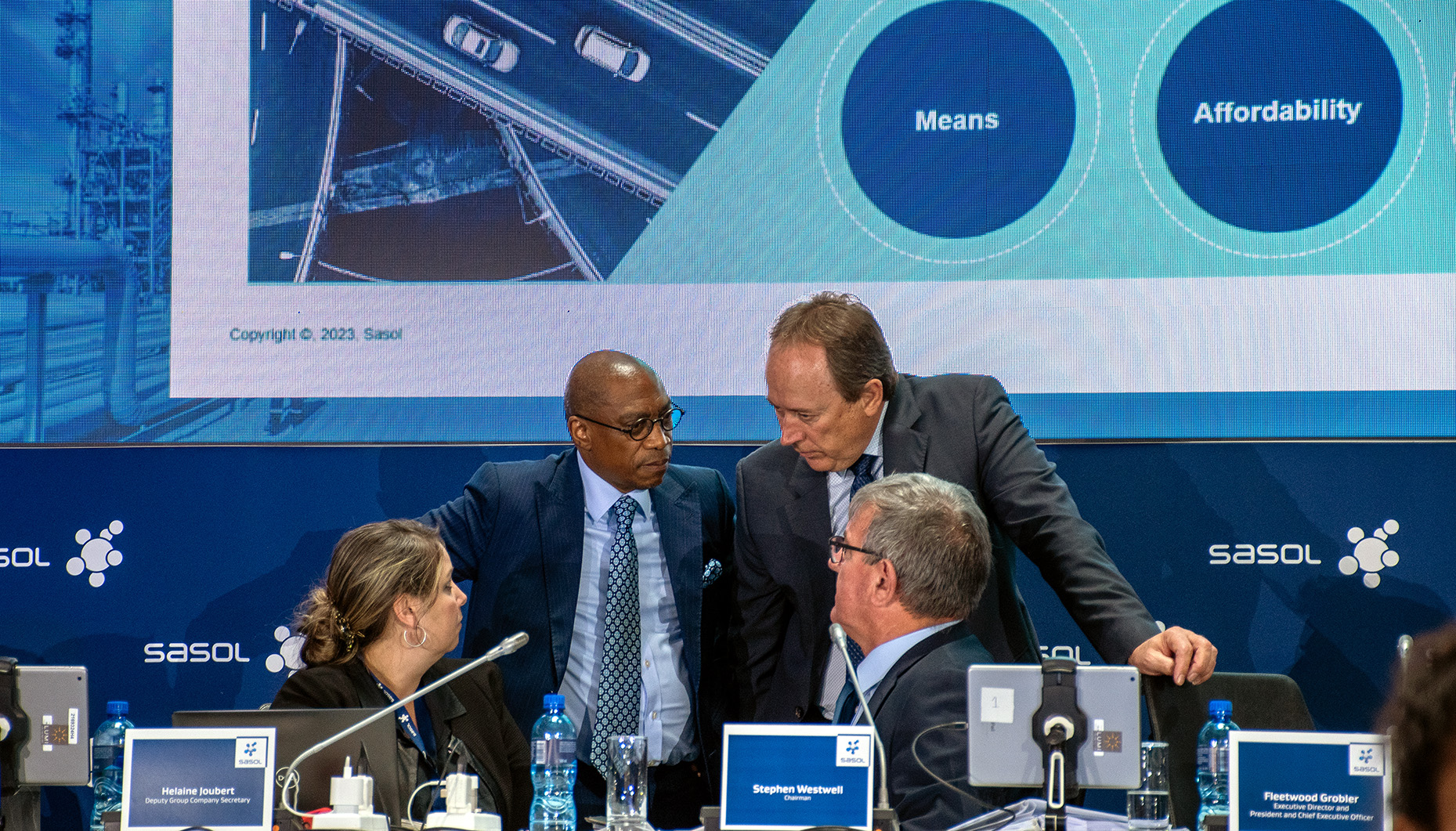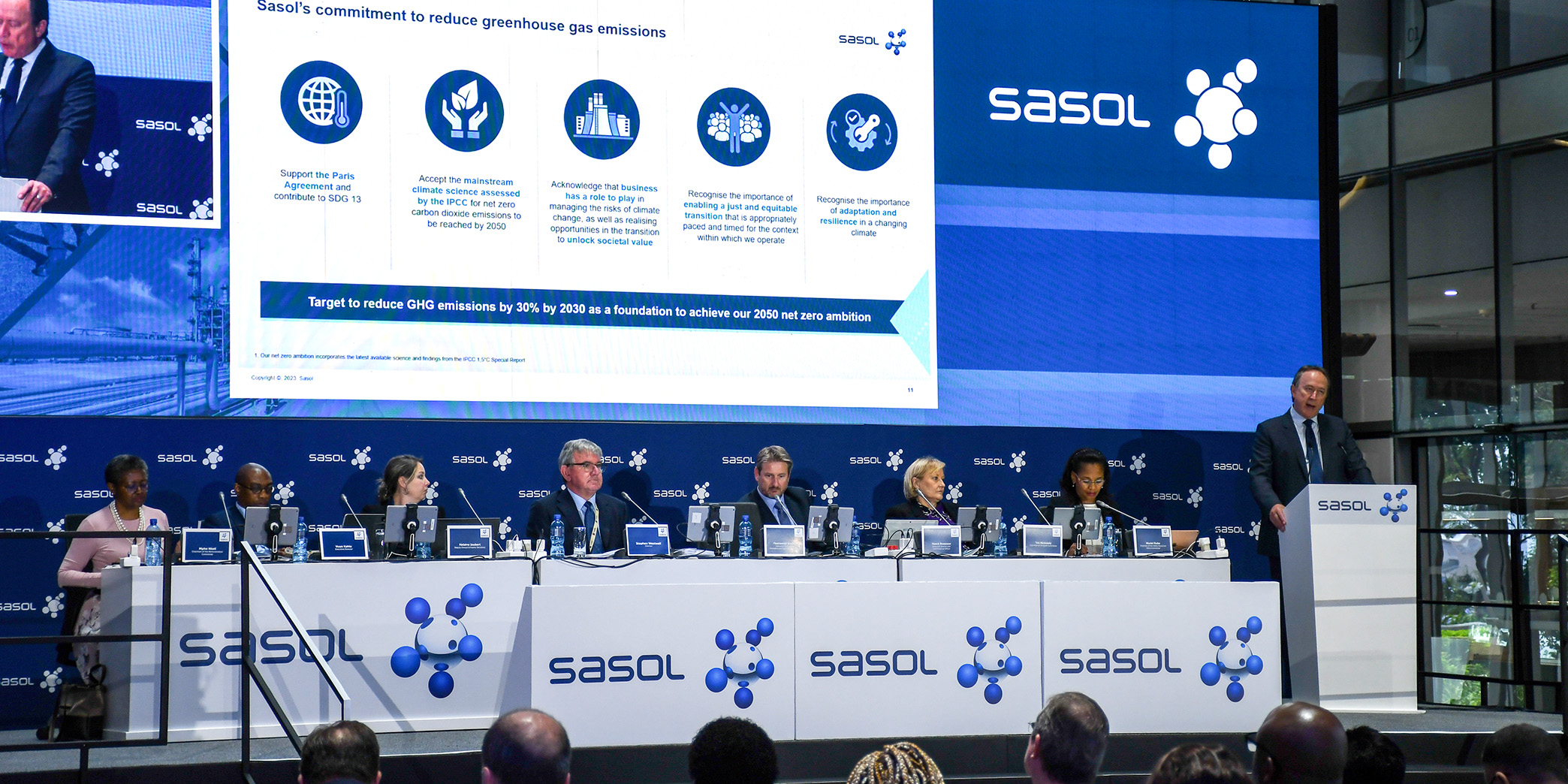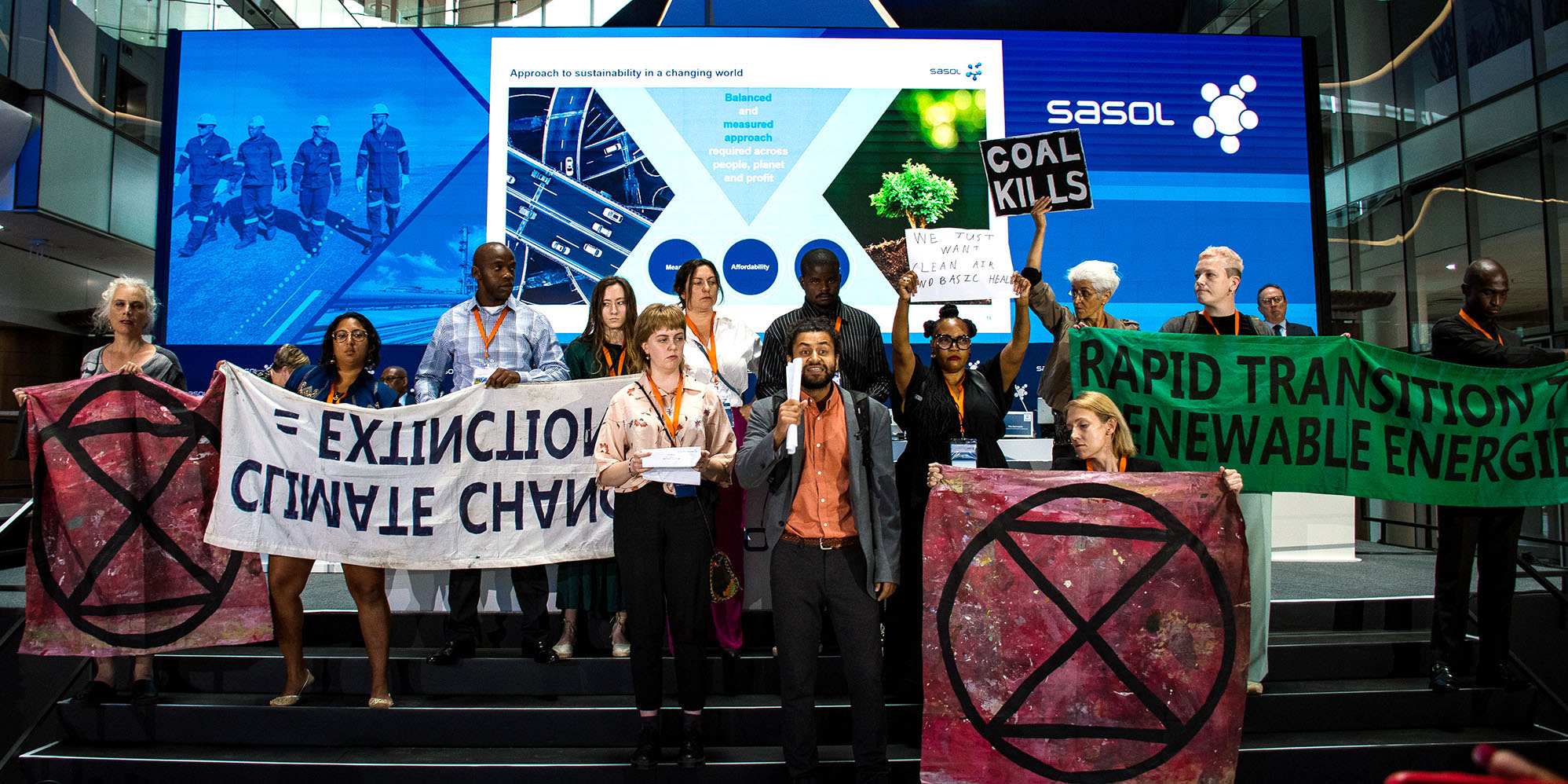ANNUAL GENERAL MEETING
Former Sasol employees challenge petrochemical giant on environmental compliance at AGM

Petrochemical giant Sasol reconvened its 44th AGM with shareholders on Friday, 19 January — virtually this time, after it was aborted in November 2023 following disruptions by climate activists.
Outgoing Sasol CEO Fleetwood Grobler, who has been with the company for 40 years, referring to November’s disruption and shareholders voicing concerns over Sasol’s climate action plan, said that while they “welcome robust and constructive debate on our decarbonisation efforts … some recent views about Sasol’s approach have, regrettably, been inaccurate and it was important for us that we set the record straight”.
Read more in Daily Maverick: Sasol AGM cancelled after climate activists protest
Sasol’s decarbonisation plan, which it presented in its annual Climate Change Report, includes reducing its greenhouse gas emissions by 30% by 2030 (equating to a 19 million tonne CO2-equivalent reduction) collectively for its Secunda and Sasolburg operations and aiming for a net-zero fossil fuel-free operation by 2050.
“Let me reiterate that there is no retreat from our 2030 greenhouse gas targets or our 2050 net-zero ambition,” said Grobler at the AGM.
This “commitment to climate action” was also reiterated in an open letter to all stakeholders last November after climate activists disrupted the AGM, where Grobler said, “While our 2050 net zero ambition pathway is less certain because technologies are not yet economically available or at scale,” Sasol’s short-term targets would be achieved through:
- Optimising energy and process efficiency (12% of the 2030 target) so its sites don’t consume as much energy;
- Replacing 1,200 megawatts of power it gets from coal with renewables (6% of the target); and
- Reducing its coal feedstocks by 25% (12% of the target).
This last target would mean liquid fuel and chemical operations from its Secunda operations would be reduced by half a million tonnes, which could be replaced by sourcing gas from its Mozambique project and “sustainable sources of carbon”.
“Oil majors around the world have similar plans and targets… it’s achievable to the point it saves them money … they are just as opaque,” Caitlin Bergh, a sustainability engineer with the UCT Energy Systems Research Group, told Daily Maverick.
“Given Sasol is the single largest point-source emitter in the world [its coal-to-liquids (CTL) fuel complex in Secunda], should they not be more ambitious than others?” asked Bergh, explaining that the two CTL plants Sasol has in Secunda are five times more energy-intensive than crude refineries, and if it wanted to reduce more it could produce more chemicals and less fuel.
“Also, time delays are a factor — there’s not much time between 2026 to 2030 for a 15-25% reduction to reach the 30% cumulative as a target.”
Grobler acknowledged in his open letter that Sasol emits about 60 million tonnes of C02 equivalent annually, which is 12% of South Africa’s national greenhouse gas (GHG) inventory, making them the second-largest emitter of GHGs (after Eskom).
However, he notes that CO2 is not to be confused with air pollutants (like sulphur dioxide, particulate matter, etc) regulated through South Africa’s Air Quality Act. Sasol is also the second-largest emitter (after Eskom) of these toxic air pollutants.

Sasol executives, including Executive Director Vuyo Kahla, CEO Fleetwood Grobler and Chairman Stephen Westwell, talking while climate activists disrupt Sasol’s 2023 AGM. (Photo: Julia Evans)
The vote
One of the resolutions shareholders voted on at this AGM was Sasol’s climate change management approach. Like all the resolutions voted on, it was passed, but with the lowest majority of votes — 77.36% of shareholders voted for it.
One of Sasol’s most prominent shareholders, Old Mutual Investment Group (Omig), which has been actively engaging with Sasol on its approach to climate change for several years, voted against the climate change plan.
Robert Lewenson, the head of Responsible Investment at Omig, said: “We’re encouraged by ongoing engagement with Sasol in collaboration with other shareholders across various issues, but with respect to the climate plan, we believe there’s still much more work to be done and we look forward to engaging with Sasol in the future to get the climate plan resolution properly articulated.”
Asset manager Ninety One also voted against the plan. It said, “While climate disclosure is good and we are broadly comfortable with the science-based methodology behind the 30% CO2 reduction target for 2030, which Sasol have indicated they remain committed to, there is still too much uncertainty and lack of momentum around the implementation of the strategy, particularly the uncertainty around gas supply and a clear alternative.”
Old Mutual and Ninety One are two of Sasol’s biggest investors, with Ninety One having $490-million invested in Sasol bonds ($28-million) and shares.

Sasol CEO Fleetwood Grobler speaking about the entity’s decarbonisation plan at the 2023 AGM on 17 November 2023 at the Sasol HQ in Sandton, before it got cancelled. The rescheduled 2023 Sasol AGM took place virtually on 19 January 2024. (Photo: Julia Evans)
Former Sasol employees challenge environmental compliance
Ian Erasmus had been working as a senior process artisan at Sasol’s Secunda complex for nearly 20 years when he reported a broken valve in 2012, concerned that leaving it open would allow hazardous waste to get into Sasol’s water system, which could pollute the Vaal River.
After nothing was done, Erasmus made another protected disclosure in 2015 regarding the unlawful disposal of hazardous waste through the broken valve. He said this led to intimidation and threats from senior managers, his demotion, multiple suspensions, disciplinary hearings and eventually his dismissal.
“I have been blacklisted by Sasol, bad-mouthed by them in the media that I am a troubled employee with a long history of incidents. So I cannot find any employment anywhere,” Erasmus said.
In September 2022 at the Evander Regional Court, Sasol was charged with unlawful disposal of hazardous waste as well as Erasmus’ unlawful dismissal as a whistle-blower.
At the AGM, Erasmus questioned the viability of Sasol switching from coal to renewables as an energy source, when its technology, built in the 1980s, is not equipped to do that.
“You can’t just one day decide that you want to start putting petrol in your diesel car without making some major changes to your engine, and this is what Sasol wants you to believe it can do by just replacing coal with other gas feedstocks,” Erasmus said.
Sasol executives said they had laid out their plan clearly in their roadmap.
Grant McGillan, another former Sasol employee, also challenged Sasol at the AGM on Friday.
McGillan was employed at Sasol Secunda’s complex as a consultant engineering project manager to execute a safety and environmental project, “Coal Tar Filtration East”, between 2013 and 2016.
There was already an existing coal tar filtration (CTF) plant on the west side of the factory, which helps to remove dangerous chemicals from the atmosphere.
Another one on the east side was proposed by Sasol to comply with the updated environmental requirement for volatile organic compound emissions.
McGillan told Daily Maverick that when he arrived to manage the project in 2013, “It was like turning my clock back 10 years, those guys were so backwards.”
In 2016, McGillan told Sasol executives that the project, which had an initial investment of R1.8 billion, would require an additional R1-billion. He alleged this was met with disagreement, with Sasol saying it would only need another R300-million.
McGillan said that in mid-2016, after sending an email to the then CEO of Sasol, David Constable, about the budget and advising that the project required the purchase of new technology, a team of security and management arrived at his office and escorted him out of the Secunda factory without explanation.
“It comes down to disruption — if you disrupt power acts, you get bad outcomes,” said McGillan, saying that it took Sasol 15 years to start improving air quality.
McGillan has questioned Sasol at AGMs since 2019 about the progress of the CTF plant and its impact on people’s health.
Sasol spokesperson Alex Anderson told Daily Maverick that the CTF East project was completed within the final approved cost mandate and came into operation during the 2023 financial year.
Sasol said in its annual results that in 2021 R3.7-billion had been spent on the project.
“Production is slowly being ramped up to full potential, while remaining throughput and reliability challenges are being addressed by the operations team,” Anderson said.
McGillan said at the AGM on Friday, “Current airshed data validates that the CTF East has done nothing to improve air quality, which remains constantly unacceptable.”

Climate activists disrupted Sasol’s AGM on 17 November 2023, taking the stage after CEO Fleetwood Grobler shared Sasol’s Climate Change Report, to share testimonies of people affected by their Secunda plant in Mpumalanga. (Photo: Julia Evans)
Avoiding emission regulations
SA has Minimum Emission Standards (MES) for harmful pollutants, which are legally enforceable.
Lauri Myllyvirta, the lead analyst at the Centre for Research on Energy and Clean Air said, “The single most important standard is the standard for sulphur dioxide (SO2) emissions, because those are the ones that are responsible for the vast majority of the health impacts from the power plants.”
The MES for sulphur dioxide that were intended to come into place in 2020 have been postponed until 2025, and Eskom and Sasol are appealing that they cannot meet the “2020” standards by this extended deadline.
However, the “newer” standards that Eskom and Sasol are fighting against are shockingly weak when compared globally.
Robyn Hugo, director of climate change engagement at the shareholder activist organisation Just Share, has told Daily Maverick, “The minimum emission standards, which Sasol and Eskom argue are so onerous, are in fact hopelessly weak and inadequate. The SO2 MES are some 28 times weaker than China’s, and 10 times weaker than India’s.”
Sasol recently appealed against the national air quality officer’s (Naqo’s) decision to reject the company’s application to have sulphur dioxide from 17 coal boilers at its Secunda complex regulated through an alternative “load-based” limit. The appeal is still pending.
Hugo said that Just Share and the Naqo had opposed this appeal, “with the Naqo standing by her decision to refuse Sasol’s application. Both oppositions include the argument that granting Sasol’s application would run counter to the legislative regime which made clear that ‘rolling postponements’ of MES compliance were unlawful.”
Hugo added that although Sasol had undertaken to reduce GHG emissions by 30% by 2030, its GHG emissions had increased in the past year and it reported that it expected these emissions to increase in 2024 and “the coming years”.
At Friday’s AGM, Erasmus also posed a question about sulphur dioxide emissions to incoming CEO Simon Baloyi: “Sasol put out a media statement in 2023, where it stated that if it does not receive the approval of its 12A application [to measure its emissions differently] for their SO2 emissions, then Sasol will be forced to cut production in order to keep SO2 emissions below limits.
“Sasol spent north of R200-billion between 2015 and 2019 to build their Lake Charles facility on another continent in the USA, with the money which Sasol’s cash-cow Secunda facility provided. And now Sasol wants to use an economic tantrum, or economic extortion if you will, in order to force the government to allow it to bend and break the emissions laws here in South Africa at the Secunda facility,” said Erasmus, asking if this was a wise decision.
Initially, current CEO Grobler said at the meeting, “Any issue which is subject to a legal process [which 12A is], we won’t discuss at the AGM.”
But Itumeleng Mphake from the Centre for Environmental Rights said, “Sasol has had almost a decade to prepare for the reduction of notorious pollutants such as SO2, and prior to that has been intimately involved in multiyear collaborative processes to set pollution standards. There is now a substantial risk that the DFFE [Department of Forestry, Fisheries and the Environment] may dismiss the appeal in relation to the SO2 MES appeal.
“My question is twofold: Do you not regard these risks as a substantial risk to your operations and therefore to shareholder value? Are you able to provide detailed information on how you will ensure you have the necessary finance to ensure SO2 compliance and avoid further health impacts for local communities, respectively? I think this question should be answered as it was reported in [Sasol’s] 2023 integrated report. Therefore, refrain from saying it is under legal process.”
Grobler responded, “I think we’ve made it publicly clear that there is a substantial risk to our operations and therefore shareholder value if we have to stop operating our Secunda facility. So, therefore, we are well aware of the risk. But we are also well aware of how the merits of our case are put forward to deal with the matter.”
In terms of the finances, Grobler said their financial reports indicated that R17-billion to R25-billion would be necessary to implement the emission reduction roadmap, which includes addressing SO2. DM

















 Become an Insider
Become an Insider
Comments - Please login in order to comment.